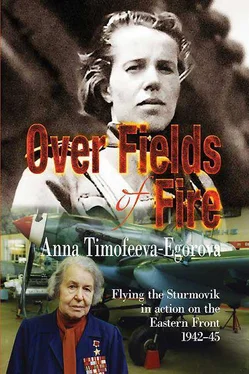When the zampolit of our regiment, Major Shvidkiy, found me in the 16th Aerial Army Headquarters, he handed me a letter. It began with somewhat unusual words:
Dear Annoushka! I am very sick, writing from bed, but it’s a pleasure to write to you. When we’d lost you, I couldn’t come to my senses from grief for quite some time. Do you understand that feeling? I don’t understand it clearly myself, but I know for sure that you mean a lot to me. Maybe it’s not the right time to write about it, because you’ve got other stuff to think about. I’ve been doing everything I can for you and even a bit more than that. Be as cool-headed as you can, but be persistent. I hope Major Shvidkiy will bring you back to the regiment! I beg you to come and see me first thing, for otherwise I’ll be offended. Everyone in the regiment is waiting for you. If they don’t allow you to come — be patient and remember that you’re always on my mind and I will be nagging the commanders. But I do want to believe that you will come…
I embrace your slender shoulders as a friend and wish you well.
With deep respect,
V. Timofeev 21.02.45.
This letter was written by the Commander of our 197th Ground Attack Aviation Division Colonel Vyacheslav Arsenyevich Timofeev. His words amazed and delighted me, and its content made me pensive. Why was he writing to me like that? I didn’t know much about him… Moreover, I’d always related to the commanders with a certain alienation and mistrust. They even joked in the regiment that Egorova simply ignored the commanders, and because of that still hung around with the lieutenants while acting as a lieutenant-colonel. I had even had a ‘conflict’ with the Division Commander. Back then the regiment was relocating to the Dys aerodrome near Lublin. I’d been scheduled to move there with the last group. Whilst I was standing and talking to the pilots, the Division Commander appeared out of the blue. He came up to us, and I reported by the book and said that an Il-2 would soon be ready after repairs and we would be taking off.
“Take me up with you”, the colonel asked as if joking.
“What do you mean ‘take me up’? You’re welcome to fly with us. But you, as the senior in rank, will be the leader”, I replied.
“Oh, no, I don’t want to be leader. I’d better form up at the rear of your group”, the colonel said again, — overacting a bit, as I thought.
“I don’t like the superiors looking over my shoulder!” I rapped out without stopping to think. The colonel took offence, turned around and left, saying nothing. After that he did his best not to notice me, and I was glad of it: one way or another I was further out of the commanders’ sight.
But nevertheless I was cheered by that letter. I was pleased to know that there was someone in the wide world who thought and cared about me, was trying to improve my lot. It turned out that Timofeev had requested Shvidkiy take me to the Division Headquarters, which was based in Zamtera. We did so, and the Division Commander received me joyfully and cordially. He kept my hands in his for some time, looking closely at the burns, and then suddenly kissed them. I quickly jerked my hands back and blushed, and he began to invite me and Shvidkiy to have lunch with him. The Komdiv 176 176 Translator’s note — Division Commander.
called an orderly and instructed him to bring three lunches from the aerial personnel mess, and produced a bottle of wine from somewhere. After lunch the Komdiv said: “Now, Annoushka, you need to stay in our army hospital, get treatment and then, when the doctors give their verdict and depending on how you’re feeling, we’ll decide the question of your further service…”
They kept me in the army hospital a short time and sent me to Moscow at the disposal of the Air Force Personnel Department (my position — Regimental Navigator — was scheduled to the Air Force Personnel Department). The head of the Personnel Department General Shadskiy told me I would be sent to the disposal of the Serpoukhov Military Commissariat for my further service.
“There will be a Lieutenant going with you”, the personnel man explained. “Head off tomorrow by train, the Lieutenant will pick you up from home with your personal papers in a package.”
Indeed, in the morning a lieutenant with Air Force shoulder boards popped in and off we went. On arrival at the spot we visited the Military Commissariat where an orderly opened the package. Another one with a wax seal was found inside it. “You have to go to the school. It’s next door to our building. You’ll see it — it’s behind barbed wire. Reception is on the opposite side from us”, the man on duty directed us further.
At the checkpoint, when the Lieutenant showed the package, they let us through to someone in charge. To be honest, I still couldn’t figure out where they were taking me. And suddenly the lieutenant told me: “Sit a while in reception, and I’ll go into the office by myself first.”
He went in, and I heard someone behind the door coarsely cursing the lieutenant over and shouting: “Why are you escorting a criminal with outa firearm?” The Lieutenant calmly explained: “Comrade General, she’s wounded, in uniform, with medals. And look what a reference she’s got… She was put forward for the rank of Hero of the Soviet Union posthumously…”
But there was obscene language again — and the lieutenant flew out of the office like a bullet.
“Let’s get out of here quick! They’re bastards in your Air Force. They’re sending a checked-up person for a trial…”
For the rest of the trip on the train we were silent. I felt completely run-down, and the lieutenant barely managed to walk me to the Arbat. I never met my escort again.
Having recovered under the all-seeing eye of Ekaterina Vasilievna — my brother’s wife — I went to the Directorate-General of the Air Force, to the personnel department, to see General Shadskiy. I was heading there with the firm intention of spitting in his face and then what would be would be… But he would not see me, as if having guessed my intention. In the medical department they gave me a referral to the Medical Examination Board. They said that after the examination, they would send me to a sanatorium.
After that everything went simply. The doctors quickly concluded: ‘Unfit for military service — disabled war veteran, 2nd category’… Of course that was a great shock to me. But my youth and natural optimism won: I decided to take some treatment and go back to my dear Metrostroy .
At the end of April 1945 Colonel Timofeev returned from Germany on leave, found me on the Arbat staying with my brother Vasiliy’s family and offered me ‘his hand and heart’, as they used to say in the old days. His offer both surprised and frightened me. I was surprised for he was a man more than twenty years older than me, who had asked me to become his wife. I was frightened because he was doing it hardly knowing me at all. I’d been crippled by the war, and the wound in my soul, that had appeared after Victor Kroutov’s death, had not stopped bleeding…
“Are you joking?” I asked Timofeev then.
“No, I’m in no laughing mood. I’m making the most serious step in my life.”
“And how many such steps have you fitted into your adult life?” I asked saucily. “The pilots who had studied in schools under your command used to say you’d had a few such teps!”
The Colonel blushed but told me that he had a wife and daughter, but when he’d been demoted from the position of Aviation Brigade Commander in Transbaikalia and out in a jail in Chita in 1938 as an ‘enemy of the people’, his wife had married another man…
Читать дальше












